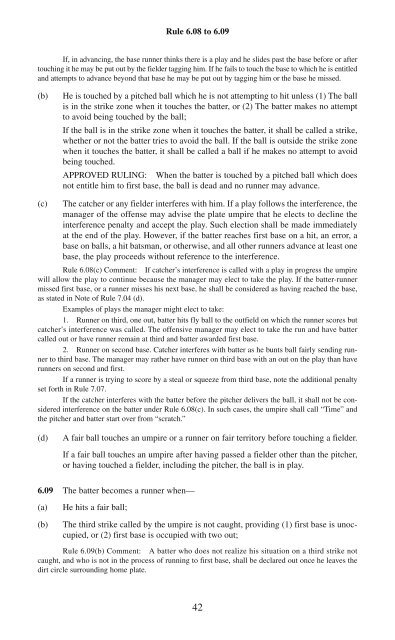OFFICIAL BASEBALL RULES
1SPD1Aq
1SPD1Aq
Create successful ePaper yourself
Turn your PDF publications into a flip-book with our unique Google optimized e-Paper software.
Rule 6.08 to 6.09If, in advancing, the base runner thinks there is a play and he slides past the base before or aftertouching it he may be put out by the fielder tagging him. If he fails to touch the base to which he is entitledand attempts to advance beyond that base he may be put out by tagging him or the base he missed.(b)He is touched by a pitched ball which he is not attempting to hit unless (1) The ballis in the strike zone when it touches the batter, or (2) The batter makes no attemptto avoid being touched by the ball;If the ball is in the strike zone when it touches the batter, it shall be called a strike,whether or not the batter tries to avoid the ball. If the ball is outside the strike zonewhen it touches the batter, it shall be called a ball if he makes no attempt to avoidbeing touched.APPROVED RULING: When the batter is touched by a pitched ball which doesnot entitle him to first base, the ball is dead and no runner may advance.(c) The catcher or any fielder interferes with him. If a play follows the interference, themanager of the offense may advise the plate umpire that he elects to decline theinterference penalty and accept the play. Such election shall be made immediatelyat the end of the play. However, if the batter reaches first base on a hit, an error, abase on balls, a hit batsman, or otherwise, and all other runners advance at least onebase, the play proceeds without reference to the interference.Rule 6.08(c) Comment: If catcher’s interference is called with a play in progress the umpirewill allow the play to continue because the manager may elect to take the play. If the batter-runnermissed first base, or a runner misses his next base, he shall be considered as having reached the base,as stated in Note of Rule 7.04 (d).Examples of plays the manager might elect to take:1. Runner on third, one out, batter hits fly ball to the outfield on which the runner scores butcatcher’s interference was called. The offensive manager may elect to take the run and have battercalled out or have runner remain at third and batter awarded first base.2. Runner on second base. Catcher interferes with batter as he bunts ball fairly sending runnerto third base. The manager may rather have runner on third base with an out on the play than haverunners on second and first.If a runner is trying to score by a steal or squeeze from third base, note the additional penaltyset forth in Rule 7.07.If the catcher interferes with the batter before the pitcher delivers the ball, it shall not be consideredinterference on the batter under Rule 6.08(c). In such cases, the umpire shall call “Time” andthe pitcher and batter start over from “scratch.”(d)A fair ball touches an umpire or a runner on fair territory before touching a fielder.If a fair ball touches an umpire after having passed a fielder other than the pitcher,or having touched a fielder, including the pitcher, the ball is in play.6.09 The batter becomes a runner when—(a)(b)He hits a fair ball;The third strike called by the umpire is not caught, providing (1) first base is unoccupied,or (2) first base is occupied with two out;Rule 6.09(b) Comment: A batter who does not realize his situation on a third strike notcaught, and who is not in the process of running to first base, shall be declared out once he leaves thedirt circle surrounding home plate.42


